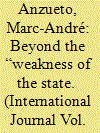|
|
|
Sort Order |
|
|
|
Items / Page
|
|
|
|
|
|
|
| Srl | Item |
| 1 |
ID:
188900


|
|
|
|
|
| Summary/Abstract |
During the 2021 mass protests in Colombia, and while international calls for the Colombian government to respect human rights were intensifying, Canada’s position remained somewhat ambiguous. Part of Canada’s ambiguity can be explained by a simplistic characterization of Colombia as a “weak state.” This article assesses Canada’s bilateral relationship by historizing the development of Colombia’s governance in the key overlapping sectors of security, human rights, and natural resources. From extensive fieldwork, we distinguish two competing rationalities based on the articulation of the notions of “conflict” and “dissent” with the notion of the “rule of law.” We believe that Canada’s bilateral relation with Colombia in the last decades has overlooked the contradictions that exist between democratizing rationalities and antipolitical rationalities. As a result, Canada’s foreign policy has been based on an overly simplistic conception of the relationship between development, security, and the rule of law.
|
|
|
|
|
|
|
|
|
|
|
|
|
|
|
|
| 2 |
ID:
188910


|
|
|
|
|
| Summary/Abstract |
During the 2021 mass protests in Colombia, and while international calls for the Colombian government to respect human rights were intensifying, Canada’s position remained somewhat ambiguous. Part of Canada’s ambiguity can be explained by a simplistic characterization of Colombia as a “weak state.” This article assesses Canada’s bilateral relationship by historizing the development of Colombia’s governance in the key overlapping sectors of security, human rights, and natural resources. From extensive fieldwork, we distinguish two competing rationalities based on the articulation of the notions of “conflict” and “dissent” with the notion of the “rule of law.” We believe that Canada’s bilateral relation with Colombia in the last decades has overlooked the contradictions that exist between democratizing rationalities and antipolitical rationalities. As a result, Canada’s foreign policy has been based on an overly simplistic conception of the relationship between development, security, and the rule of law.
|
|
|
|
|
|
|
|
|
|
|
|
|
|
|
|
| 3 |
ID:
088083


|
|
|
|
|
| Publication |
2009.
|
| Summary/Abstract |
This article analyzes the emergence of new human rights norms for transnational corporations. It first explores voluntary norm-making approaches, which have been a staple of this issue area since the 1970s. Second, it analyzes the formulation and eventual fall of the UN Draft Norms on the Responsibilities of Transnational Corporations and Other Business Enterprises with Regard to Human Rights. A final section reflects on the work of the UN special representative of the secretary-general on business and human rights, John Ruggie, and the future of norm making in this area. It is argued that these three processes constitute differing but fundamental steps toward the construction of international human rights norms for corporations and that, although norm entrepreneurs have clashed in debates over voluntary versus binding standards, norm making in this area remains healthy thanks to a now more solid international awareness regarding the corporate responsibility toward human rights.
|
|
|
|
|
|
|
|
|
|
|
|
|
|
|
|
| 4 |
ID:
088084


|
|
|
|
|
| Publication |
2009.
|
| Summary/Abstract |
This article analyzes the emergence of new human rights norms for transnational corporations. It first explores voluntary norm-making approaches, which have been a staple of this issue area since the 1970s. Second, it analyzes the formulation and eventual fall of the UN Draft Norms on the Responsibilities of Transnational Corporations and Other Business Enterprises with Regard to Human Rights. A final section reflects on the work of the UN special representative of the secretary-general on business and human rights, John Ruggie, and the future of norm making in this area. It is argued that these three processes constitute differing but fundamental steps toward the construction of international human rights norms for corporations and that, although norm entrepreneurs have clashed in debates over voluntary versus binding standards, norm making in this area remains healthy thanks to a now more solid international awareness regarding the corporate responsibility toward human rights.
|
|
|
|
|
|
|
|
|
|
|
|
|
|
|
|
| 5 |
ID:
175400


|
|
|
|
|
| Summary/Abstract |
This article uses snapshots, rather than the ongoing flows of diffusion/contestation typically emphasized by constructivists, to explore the exercise of power through normative change. Its case is a high-profile Human Rights Council initiative: the UN Guiding Principles on Business and Human Rights (UNGP s). These UNGP s have successfully presented meanings as fixed while actually stretching those meanings’ boundaries. They reconceptualize what it means to “respect” and “protect” human rights. This is surprising given that the principles were framed as a conservative exercise at clarification, and under-noticed due to the legal rather than conceptual focus of the existing critical literature. To respect human rights, according to the UNGP s, agents need to take costly positive action. Furthermore, protect obligations come before respect. These are significant innovations. On the other hand, two missed opportunities of the UNGP s are their thin harm-based foundation for respect obligations, and their state centrism about who has duties to protect.
|
|
|
|
|
|
|
|
|
|
|
|
|
|
|
|
| 6 |
ID:
188699


|
|
|
|
|
| Summary/Abstract |
Human rights in global value chains have become a key field of study in international law and corporate governance. The analysis often starts with a gap – a ‘governance gap’ in human rights protection. This pragmatic starting point calls for pragmatic solutions: better corporate compliance and more accountability. While this goes a long way in addressing corporate misconduct, the global corporate form, its power and legitimation in transnationally generating and appropriating value tend to become naturalized phenomena. Moreover, the effects of accountability agendas on corporate power and legitimation are hardly considered. Instead, I propose to address the ‘human rights problem’ by understanding the corporation and its networks as consequences of international politics – conceptualized as inter-societal multiplicity. The multiplicity lens offers a possibility to replace the governance gap with a productive conception of inter-societal conditions and can complement the focus on accountability and compliance. I conclude the article by tentatively sketching three important consequences of such a starting point for defining the problem of human rights in global value chains: the international dimensions of the division of labour under competitive conditions, the legitimation of corporate practices and the production of knowledge for their regulation.
|
|
|
|
|
|
|
|
|
|
|
|
|
|
|
|
| 7 |
ID:
144836


|
|
|
|
|
| Summary/Abstract |
This article considers the problem of extraterritorial human rights violations committed by transnational corporations (TNCs), and draws on Crouch's framework in Post-democracy to illustrate why the issue has proved so difficult for states to regulate. I begin by examining the problem of corporate regulation more generally, and set out Crouch's analysis to show why and how corporations have become so influential. The second section considers the area of business and human rights, and explains why there is ‘a governance gap’ in relation to extraterritorial human rights violations committed by corporations. The third section describes efforts at the international and domestic levels to regulate corporations in relation to this issue. It concludes that while new international principles and innovative hybrid schemes are playing a valuable role in norm creation and standard-setting, the enforcement of these principles remains limited. Corporations have largely succeeded to date in their lobbying efforts to remain free of any direct obligations under international law.
|
|
|
|
|
|
|
|
|
|
|
|
|
|
|
|
|
|
|
|
|